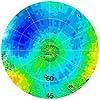| . |  |
. |
The Wellcome Trust biomedical research charity has agreed to help finance the mass spectrometer which is central to Beagle 2 and is being pioneered by the group at the Open University led by Beagle 2 Lead Scientist Professor Colin Pillinger. The Trust is providing �2.6m to pay for construction of the miniature instrument and to investigate how the technology may be extended beyond that developed for a mission to Mars. Professor Pillinger said "We are delighted that the Wellcome Trust has come on board. Not only will the additional research grant support the flight hardware but it will allow us to exploit possible spin-offs of an instrument designed for the rigours of working remotely on Mars for biomedical and clinical applications here on Earth". Dr Michael Dexter, Director of the Wellcome Trust added "This is beyond blue skies research and with such a voyage of discovery novel ideas are bound to emerge" Related Links Wellcome Trust Mars Express Beagle 2 SpaceDaily Search SpaceDaily Subscribe To SpaceDaily Express  Los Angeles - Apr 04, 2002
Los Angeles - Apr 04, 2002Over the past week, there have been two important developments connected with plans by NASA and the European Space Agency to land as many as three spacecraft on during 2003-04 Mars window. Mars Express Has The Science Payloads To Find Water Ice  Paris (ESA) Jun 03, 2002
Paris (ESA) Jun 03, 2002"The presence of such a large amount of water ice under Mars's surface is very surprising. Especially so close to the surface!" says Gerhard Schwehm, Head of the Planetary Missions Division at ESA. The team working on ESA's Mars Express, the next mission to the Red Planet, is thrilled by NASA's Mars Odyssey detection of hydrogen-rich layers under the Martian surface. Marsquake Detection Sensors Will Take Search For Water Underground  London - Jun 03, 2002
London - Jun 03, 2002Researchers at Imperial College London have just begun a 5-year project to design and build tiny earthquake measuring devices to go to Mars on the 2007 NetLander mission. Mars Odyssey Quenches Researchers' Thirst For Water Data  Los Alamos - Jun 03, 2002
Los Alamos - Jun 03, 2002Researchers with the Department of Energy's Los Alamos National Laboratory have determined that Mars has enough water to sustain human exploratory missions.
|
| ||||||||||
| The content herein, unless otherwise known to be public domain, are Copyright 1995-2016 - Space Media Network. All websites are published in Australia and are solely subject to Australian law and governed by Fair Use principals for news reporting and research purposes. AFP, UPI and IANS news wire stories are copyright Agence France-Presse, United Press International and Indo-Asia News Service. ESA news reports are copyright European Space Agency. All NASA sourced material is public domain. Additional copyrights may apply in whole or part to other bona fide parties. Advertising does not imply endorsement, agreement or approval of any opinions, statements or information provided by Space Media Network on any Web page published or hosted by Space Media Network. Privacy Statement All images and articles appearing on Space Media Network have been edited or digitally altered in some way. Any requests to remove copyright material will be acted upon in a timely and appropriate manner. Any attempt to extort money from Space Media Network will be ignored and reported to Australian Law Enforcement Agencies as a potential case of financial fraud involving the use of a telephonic carriage device or postal service. |